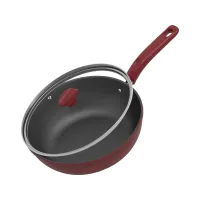How do I choose a wok pan?
Choosing the right wok pan involves considering various factors to suit your cooking style, kitchen setup, and personal preferences. Here are some key considerations to help you make an informed decision:
Material:
Carbon Steel: Traditional woks are often made of carbon steel. They are lightweight, heat up quickly, and respond well to changes in temperature. Carbon steel woks are suitable for high-heat cooking methods like stir-frying.
Cast Iron: Cast iron woks retain heat well and provide even heating. They are durable but can be heavier than other materials. Seasoning is required to prevent rusting and maintain a non-stick surface.
Stainless Steel: Stainless steel woks are durable, resistant to rust, and easy to clean. However, they may not heat as quickly as carbon steel or cast iron, and they may not have the same non-stick properties.
Size:
Wok sizes typically range from 12 to 14 inches in diameter. The size you choose depends on the number of people you usually cook for and the size of your stovetop. Larger woks are suitable for cooking in larger quantities, while smaller ones are more manageable for smaller households.
Shape:
Traditional Round Bottom: Round-bottom woks are ideal for traditional stir-frying techniques where the wok is held over an open flame. They require a wok ring or specialized burner to stabilize them on a Western-style stovetop.

Flat Bottom: Flat-bottom woks are designed for use on flat surfaces, such as electric or gas stovetops. They provide stability without the need for additional accessories. Some also have a small flat section on the bottom, making them versatile for different stovetop types.
Handles:
Single Long Handle: Wok pans with a single long handle are more common in Western kitchens. They are easier to maneuver and can be used for tossing and flipping ingredients.
Dual Side Handles: Woks with dual side handles are more traditional in Asian kitchens. They provide a secure grip for lifting and tilting the wok. Consider which handle style feels more comfortable for you.
Coating:
Non-Stick Coating: Some woks come with a non-stick coating, which can make cooking and cleaning easier. However, this coating may wear off over time, especially with high-heat cooking methods.
Natural Seasoning (for Cast Iron or Carbon Steel): Cast iron and carbon steel woks can be seasoned over time to develop a natural non-stick surface. Regular seasoning involves coating the wok with oil and heating it to create a protective layer.
Price:
Wok prices can vary based on material, brand, and features. Consider your budget and invest in a high-quality wok that suits your cooking needs.
Brand and Reviews:
Research reputable brands and read customer reviews to get insights into the performance and durability of different woks. Customer feedback can provide valuable information about a specific wok's pros and cons.
Compatibility with Stovetop:
Ensure that the wok you choose is compatible with your stovetop. For example, if you have an induction cooktop, make sure the wok is suitable for induction cooking.
By considering these factors, you can select a wok pan that aligns with your cooking preferences and kitchen setup, ensuring an enjoyable and efficient cooking experience.



